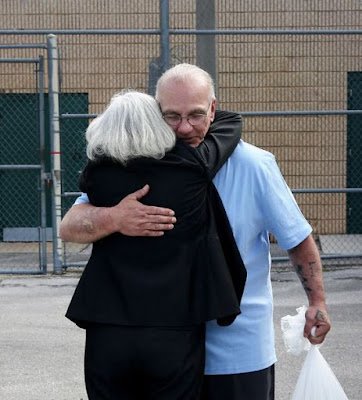After 35 years, two death sentences and a thrown-out conviction, a case comes to an end.
BROOKSVILLE — Paul Hildwin waited for nearly 35 years. He waited in jail and then prison and then jail again. He waited for, and then survived, a death warrant.
He got cancer twice. He got sick of the iron and concrete surrounding him. He got a back tattoo of skulls and tombstones arranged in what he called a gateway to “my own living hell.”
In 1996, ten years after a Hernando County jury sentenced him to death in the killing of 42-year-old Vronzettie Cox, he got a resentencing hearing. But that ended in yet another death sentence, and so he waited for death, until in 2014 the Florida Supreme Court overturned his sentence and gave him something else to wait for: A new trial and, maybe, the chance to feel grass beneath his feet again.
He stopped waiting Monday. The new trial was set to begin that morning, but instead, he accepted a deal: He pleaded no-contest to second-degree murder in exchange for a suspended life sentence and eternal probation. Hours later, he walked out of the Hernando County jail.
Hildwin’s attorney, Tampa-based lawyer Lyann Goudie, was surprised when prosecutors offered the deal late last week — she said she thought they’d dug in their heels. And she thought she could convince a jury that Hildwin, now 59, wasn’t guilty. But she said she understood Hildwin’s decision to take the clear shot at release rather than leave it up to a jury.
“How in the world aren’t you going to take an opportunity to just get out of jail?” Goudie said.
Hildwin will go to transitional housing in the Tampa area, Goudie said, though Goudie didn’t disclose a specific location.
Hildwin’s long saga through the criminal justice system began in 1985, when he ran out of gas on U.S. 19 and took a ride from Cox. Four days later, her car was found in the woods. Her nude body was stuffed in the trunk. She had been strangled with a T-shirt, and investigators believed she’d been raped.
Investigators found Hildwin with a ring and a radio stolen from Cox, and they learned he’d forged and cashed a $75 check from her checkbook. Hildwin told authorities that after Cox picked him up, she and her boyfriend started fighting, and he took them while they weren’t looking.
Experts at the time linked semen and saliva found at the scene to Hildwin, and they said it couldn’t have belonged to the boyfriend. But decades later, after a push by the Innocence Project, modern testing showed that the fluids didn’t belong to Hildwin after all — and that they matched the boyfriend, William Haverty, who later spent 20 years in prison for an unrelated child sex abuse conviction.
That was enough for the Florida Supreme Court to overturn the conviction and order a new trial. But several delays, some caused by changes in Hildwin’s legal team as well as his own health issues, meant nearly six more years elapsed in the meantime.
The 34-year gulf set up a trial that would have relied on old testimony from more than a dozen witnesses who are now dead or otherwise incapacitated.
Goudie had anticipated those testimonies would complicate the case — in her motion to dismiss the case last year, she argued that Hildwin’s original trial attorney was inexperienced and incompetent, and that without a new chance to cross-examine witnesses, he wouldn’t get a fair trial.
Richard Buxman, the assistant state attorney prosecuting the case, said he too saw the lack of witnesses as a major problem, especially after the recent death of the lead crime scene technician.
“There are a lot of legal difficulties trying a case where a lot of essential witnesses are deceased,” he said after Monday’s plea hearing. “We felt (the plea deal) was legally the best resolution to the case.”
That feeling seemed to be shared by most in the courtroom Monday morning — Hildwin, the attorneys, Judge Stephen Toner — except for Vronzettie Cox’s children, who appeared via video, their faces broadcast to the courtroom with a television behind Toner.
“The state of Florida has failed my family,” said a son who identified himself as Rodney. “They’ve failed my mother. The state has proven itself incompetent to find Paul either guilty or innocent ... I’m sure the interest of the state has been served, but I don’t think any of the human beings involved in this case have been served.”
Hildwin left the Hernando County jail just after 11 a.m. Monday. He hugged his legal team, his voice barely a croak as he thanked them.
Fifteen minutes later, he stepped barefoot onto the asphalt of a parking lot at nearby Tom Varn Park. His only outdoor time for decades had been confined by concrete floors and chain link canopies. He’d told Goudie that his only wish was to walk through the grass once more before he died.
He crossed the parking lot and paused there at the threshold. He started to step and hesitated, one pale foot hovering for a long second over the grass. Then, as he leaned forward and dropped his foot, he let out a soft chuckle that sounded like surprise, or relief.
“The things we take for granted, right?” said Goudie, standing next to him.
Hildwin shuffled his feet across the earth. “It’s just the simplest things,” he said quietly.
Source: tampabay.com, Jack Evans, March 9, 2020
Florida | Inmate cleared by DNA evidence released from Brooksville prison
BROOKSVILLE, Fla. - After 35 years of incarceration, 29 of which were spent on death row, Paul Hildwin was released from the Hernando County Detention Center in Brooksville, Florida, on March 9.
According to the Innocence Project, which represented and investigated Hildwin’s case, he was released with time served after pleading no contest to second-degree murder, stemming from a 1985 case.
Hildwin was originally sentenced to death in 1985, and in 2014 the Florida Supreme Court reversed his capital murder conviction and death sentence.
The reversal was based on new DNA evidence, proving DNA originally tied to Hildwin “actually belonged to the victim’s estranged boyfriend, whom Hildwin had always contended was the likely true killer,” the Innocence Project release said.
Ahead of retrial, in which prosecutors said they would seek the death penalty, Tampa criminal defense attorney Lyann Goudie negotiated the plea agreement, allowing for Hildwin to walk away with time served.
Source:
fox5dc.com, Staff, March 9, 2020
⚑ | Report an error, an omission, a typo; suggest a story or a new angle to an existing story; submit a piece, a comment; recommend a resource; contact the webmaster, contact us:
deathpenaltynews@gmail.com.
Opposed to Capital Punishment? Help us keep this blog up and running! DONATE!
"One is absolutely sickened, not by the crimes that the wicked have committed,
but by the punishments that the good have inflicted." -- Oscar Wilde













